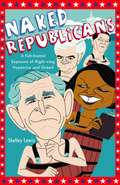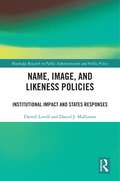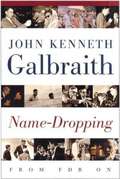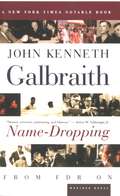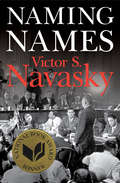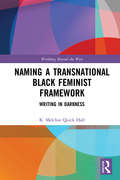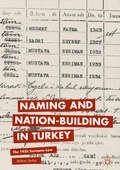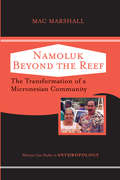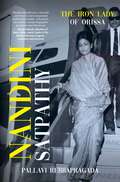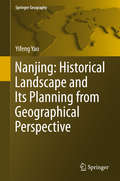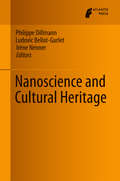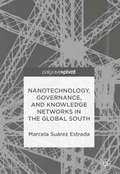- Table View
- List View
Naked Fashion
by Safia Minney Lucy Siegle Livia FirthNaked Fashion invites you to join the movement of consumers, entrepreneurs, and creative professionals who are using their purchasing power, talents, and experience to make fashion more sustainable. Anyone with an active interest in fashion and where our clothes come from or looking for a career in fashion and the media will find inspiration and advice on how to make a difference. Designers and creatives from all over the world--including photographers, models, illustrators, actors, and journalists--talk about what they are doing differently to make fashion more sustainable: Emma Watson explains why fair trade fashion is so important to her. Summer Rayne Oakes describes how she took on the model agencies. Vivienne Westwood talks high-fashion without the high stakes for the planet. Inside you will find fair trade and environment, styling and modeling, up-cycling and "slow" fashion, how we can change the high street, an ethical brand directory, and stunning visuals throughout. Safia Minney is founder and CEO of fair trade and sustainable fashion label People Tree. She has turned a lifelong interest in environment, trade, and social justice issues into an award-winning social business. Minney is widely regarded as a leader in the fair trade movement and has been awarded Outstanding Social Entrepreneur by the World Economic Forum and an MBE for her work in fair trade and the fashion industry.
Naked Republicans: A Full-frontal Exposure of Right-wing Hypocrisy
by Shelley LewisNaked Republicans is the exposé you’ve been waiting for. From Cheney to Condi, from DeLay to the Dukester, from Newt to Rummy, these are the weasels, wackos, and wingnuts who turned the party of Lincoln into a five-kegger blowout. For the first time, in one hilarious roundup, Shelley Lewis reveals the naked truth about the fiscal conservatives who spend money like they print it themselves (oh, right–they do); the pious pols who regard the institution of marriage so highly they’ve moved on to their second and third wives; and the deceitful dissemblers who’ve earned a place in the Hall of Shame. In these troubled times, when you don’t know whether to laugh or cry, Naked Republians puts the hip back in hypocrisy and restores the fun to fundamentalism!
Naked Truth: Strip Clubs, Democracy, and a Christian Right
by Judith Lynne HannaAcross America, strip clubs have come under attack by a politically aggressive segment of the Christian Right. Using plausible-sounding but factually untrue arguments about the harmful effects of strip clubs on their communities, the Christian Right has stoked public outrage and incited local and state governments to impose onerous restrictions on the clubs with the intent of dismantling the exotic dance industry. But an even larger agenda is at work, according to Judith Lynne Hanna. In Naked Truth, she builds a convincing case that the attack on exotic dance is part of the activist Christian Right’s “grand design” to supplant constitutional democracy in America with a Bible-based theocracy. Hanna takes readers onstage, backstage, and into the community and courts to reveal the conflicts, charges, and realities that are playing out at the intersection of erotic fantasy, religion, politics, and law. She explains why exotic dance is a legitimate form of artistic communication and debunks the many myths and untruths that the Christian Right uses to fight strip clubs. Hanna also demonstrates that while the fight happens at the local level, it is part of a national campaign to regulate sexuality and punish those who do not adhere to Scripture-based moral values. Ultimately, she argues, the naked truth is that the separation of church and state is under siege and our civil liberties—free speech, women’s rights, and free enterprise—are at stake.
Name, Image, and Likeness Policies: Institutional Impact and States Responses (Routledge Research in Public Administration and Public Policy)
by Darrell Lovell Daniel MallinsonThis book examines the path that name, image, and likeness (NIL) has taken in the first years of the policy, how the expansion has led to differing approaches across state and universities, and how administrators in selected states are dealing with the rulemaking power they have. After an introduction contextualising how NIL policies have impacted the administrative approach at institutions, the remaining chapters focus on how NIL has altered the role of compliance offices and administrators tasked with monitoring academic and financial activity in athletic departments. Chapters leverage theories of policy diffusion and implementation to offer context on the topics from administrative and policy perspectives, whilst also examining how entrepreneurs are both using the policies to advance the status of the athletic arms of their institutions while dealing with these compliance struggles. The authors conclude with a discussion of an unsettled policy landscape and whether stricter guidelines are on the horizon. Name, Image, and Likeness Policies will appeal to both scholars studying sport and law, public policy, public administration, state politics, and governance, as well as readers seeking to better understand what impacts NIL is having on the college system, and students connected to major sports such as college football and basketball.
Name-Dropping: From F.D.R. On
by John Kenneth GalbraithJohn Kenneth Galbraith, the noted economist, joined Franklin Delano Roosevelt and the New Deal in 1934 and served that administration during World War II; in the crucial role of Deputy Head of the Office of Price Administration in charge of price control. His service to FDR and his relationship with Eleanor Roosevelt began a long involvement with the leaders who would define much of the course of the twentieth century: Truman, Stevenson, John F. and Jacqueline Kennedy, Nehru, Lyndon Johnson, and others at home and abroad. Drawing on a lifetime of access to many of the greatest public figures, Galbraith creates a rich and uniquely personal history of the century -- a history he helped to shape. We are invited to hear FDR on the Great Depression and World War II; Albert Speer, the Third Reich's architect and armaments minister, on the boorishness and incompetence of the Nazi leadership; John F. Kennedy, from youth to the presidency; Jacqueline Kennedy's shrewd judgments of the White House inner circle. In this clear-eyed, unsparing, and amusing look back at the world and the people he has known, Galbraith tells what these leaders did -- how they looked to him then and how they look to him now -- with unforgettable reminiscences and a rich infusion of engaging anecdotes. "Name-Dropping" charts the political landscape of the past sixty-five years with the dazzling insight, humor, and literary skill that mark Galbraith as one of the most distinguished writers of our time.
Name-Dropping: From FDR On (Letras De Crítica Ser.)
by John Kenneth Galbraith&“[A] charming memoir [that] serves to remind us that idealism and trust once existed in the White House and Washington, a fact that may seem unbelievable&” (Newsday). A New York Times Notable Book &“Names? You want names? No one knows better ones than John Kenneth Galbraith,&” says the San Diego Union-Tribune. Name-Dropping covers the long and remarkable career of this economist and former ambassador, charting sixty-five years of politics, government, and American history as he writes of the many people he has known—among them Franklin and Eleanor Roosevelt, Harry S. Truman, John F. Kennedy, Adlai Stevenson, and Jawaharlal Nehru—&“with a wit, style, and elegance few can match&” (Library Journal). This &“mischievously and merrily unrepentant&” memoir offers a rich and uniquely personal history of the twentieth century—a history the author himself helped to shape (The Boston Globe). &“Shrewd, irreverent, penetrating, and hilarious.&” —Arthur M. Schlesinger Jr. &“It is not usual for a man past his 90th birthday to write a book that is as fresh and lively as the work of a 30-year-old. But John Kenneth Galbraith is not a usual man, and he has done it.&” —The New York Times
Names and Naming: Multicultural Aspects
by Oliviu Felecan Alina BugheșiuThis edited book examines names and naming policies, trends and practices in a variety of multicultural contexts across America, Europe, Africa and Asia. In the first part of the book, the authors take theoretical and practical approaches to the study of names and naming in these settings, exploring legal, societal, political and other factors. In the second part of the book, the authors explore ways in which names mirror and contribute to the construction of identity in areas defined by multiculturalism. The book takes an interdisciplinary approach to onomastics, and it will be of interest to scholars working across a number of fields, including linguistics, sociology, anthropology, politics, geography, history, religion and cultural studies.
Naming Names: With A New Afterword By The Author
by Victor S. NavaskyWinner of the National Book Award: The definitive history of Joe McCarthy, the Hollywood blacklist, and HUAC explores the events behind the hit film Trumbo. Drawing on interviews with over one hundred and fifty people who were called to testify before the House Un-American Activities Committee—including Elia Kazan, Ring Lardner Jr., and Arthur Miller—award-winning author Victor S. Navasky reveals how and why the blacklists were so effective and delves into the tragic and far-reaching consequences of Joseph McCarthy&’s witch hunts. A compassionate, insightful, and even-handed examination of one of our country&’s darkest hours, Naming Names is at once a morality play and a fascinating window onto a searing moment in American cultural and political history.
Naming Names: With A New Afterword By The Author
by Victor S. NavaskyWinner of the National Book Award: The definitive history of Joe McCarthy, the Hollywood blacklist, and HUAC explores the events behind the hit film Trumbo. Drawing on interviews with over one hundred and fifty people who were called to testify before the House Un-American Activities Committee—including Elia Kazan, Ring Lardner Jr., and Arthur Miller—award-winning author Victor S. Navasky reveals how and why the blacklists were so effective and delves into the tragic and far-reaching consequences of Joseph McCarthy&’s witch hunts. A compassionate, insightful, and even-handed examination of one of our country&’s darkest hours, Naming Names is at once a morality play and a fascinating window onto a searing moment in American cultural and political history.
Naming Violence: A Critical Theory of Genocide, Torture, and Terrorism (New Directions in Critical Theory #52)
by Professor Mathias ThalerMuch is at stake when we choose a word for a form of violence: whether a conflict is labeled civil war or genocide, whether we refer to “enhanced interrogation techniques” or to “torture,” whether a person is called a “terrorist” or a “patriot.” Do these decisions reflect the rigorous application of commonly accepted criteria, or are they determined by power structures and partisanship? How is the language we use for violence entangled with the fight against it?In Naming Violence, Mathias Thaler articulates a novel perspective on the study of violence that demonstrates why the imagination matters for political theory. His analysis of the politics of naming charts a middle ground between moralism and realism, arguing that political theory ought to question whether our existing vocabulary enables us to properly identify, understand, and respond to violence. He explores how narrative art, thought experiments, and historical events can challenge and enlarge our existing ways of thinking about violence. Through storytelling, hypothetical situations, and genealogies, the imagination can help us see when definitions of violence need to be revisited by shedding new light on prevalent norms and uncovering the contingent history of ostensibly self-evident beliefs. Naming Violence demonstrates the importance of political theory to debates about violence across a number of different disciplines from film studies to history.
Naming a Transnational Black Feminist Framework: Writing in Darkness (Worlding Beyond the West)
by K. Melchor Quick HallBy writing Black feminist texts into the international relations (IR) canon and naming a common Black feminist praxis, this text charts a path toward a Transnational Black Feminist (TBF) Framework in IR, and outlines why a TBF Framework is a much needed intervention in the field. Situated at the intersection of IR and Black feminist theory and praxis, the book argues that a Black feminist tradition of engaging the international exists, has been neglected by mainstream IR, and can be written into the IR canon using the TBF Framework. Using research within the Black indigenous Garifuna community of Honduras, as well as the scholarship of feminists, especially Black feminist anthropologists working in Brazil, the author illustrates how five TBF guiding principles—intersectionality, solidarity, scholaractivism, attention to borders/boundaries, and radically transparent author positionality—offer a critical alternative for engaging IR studies. The text calls on IR scholars to engage Black feminist scholarship and praxis beyond the written page, through its living legacy. This interdisciplinary volume will be of interest to feminist scholars, international relations students, and grassroots activists. It will also appeal to students of related disciplines including anthropology, sociology, global studies, development studies, and area studies.
Naming and Nation-building in Turkey: The 1934 Surname Law
by Meltem TürközThis book examines how the Turkish Surname Law of 1934 was adopted and reframed in diverse social contexts at a time of top down nationalism. Through historical ethnography, the author explores the genesis of the law, its drafting in parliament, the Turkish Language Reform, and its reception. The project draws from an oral historical narrative, official parliamentary and registry documents, and popular media.
Namoluk Beyond The Reef: The Transformation Of A Micronesian Community (Westview Case Studies In Anthropology)
by Mac MarshallThis case study examines emigrants from Namoluk Atoll in the Eastern Caroline Islands of Micronesia, in the Western Pacific. Most members of the Namoluk community (chon Namoluk) do not currently live there - some 60% of them have moved to Chuuk, Guam, or the mainland US (such as Honolulu, Hawai'i or Eureka, California). The question is how (and why) those expatriates continue to think of themselves as chon Namoluk, and behave accordingly, despite being a far-flung network of people, with inevitable erosions of shared language and culture.
Nan'yo: The Rise and Fall of the Japanese in Micronesia, 1885-1945 (Pacific Islands Monograph Series, No. #4)
by Mark R. PeattieJapan was ejected from portions of Micronesia at the end of World War II, yet a strong Japanese presence has continued. Older Islanders have memories of the Japanese period, and some still speak textbook Japanese
Nancy Reagan: The Unauthorized Biography
by Kitty KelleyA shocking portrait of the 1980s, America, and the woman whose position helped shape the values and policies of the Reagan administration. Through over 1,000 interviews collected during four years of exhaustive research and reporting, Kelley reveals Nancy Reagan as a superb public performer, a vain, materialistic social climber, a bitter foe and formidable strategist—an American phenomenon.
Nancy: The Story of Lady Astor
by Adrian FortA new biography of Nancy Astor, American socialite and social crusader who blazed a trail through British society amid two World WarsIn 1919, Nancy Astor became the first female Member of Parliament elected to the House of Commons—she was not what had been expected. Far from a virago who had suffered for the cause of female suffrage, Lady Astor was already near the center of the ruling society that had for so long resisted the political upheavals of the early twentieth century, having married into one of the richest families in the world. She wasn't even British, but the daughter of a famous Virginian family, and fiercely proud of her expatriate ancestry. But her moral drive was strong, and she would utilize her position of privilege and influence to blow a bracing American wind into what she regarded as the stuffy corners of British politics. This account charts Nancy Astor's incredible story, from relative penury in the American South to a world of enormous countryside estates and townhouses, and the most lavish entertainments, peopled by the great figures of the day—Churchill, Chamberlain, FDR, Charlie Chapin, J. M. Barrie, and Lawrence of Arabia were all part of her social circle. But hers was not to be an easy life of power and pure glamour; it was also defined by principles and bravery, war and sacrifice, love, and the most embittered disputes. With glorious, page-turning brio, Adrian Fort brings to life this restless, controversial American dynamo, an unforgettable woman who left a deep and lasting imprint on the political life of a nation.
Nandini Satpathy: The Iron Lady of Orissa
by Pallavi RebbapragadaObliterated from the pages of history, as women often are, Odisha&’s first woman Chief Minister, Nandini Satpathy, known also as the Iron Lady of Orissa, was born to a family of revolutionaries and intellectuals. During her teenage years in the &‘40s, this petite girl in a starchy cotton saree was jailed for pulling down the Union Jack from atop the edifice of Ravenshaw College. Thus began the makings of a force to be reckoned with. Coming up through the ranks to ultimately reach the hallowed halls of the Rajya Sabha at the mere age of 31, this grassroots student politician went on to become the I&B minister in Indira Gandhi&’s first government, where she facilitated the working of the Free Bangla Radio that played a key role in the information war that was &’71. She hobnobbed with the likes of Raj Kapoor, Nargis, and Meena Kumari as India produced films around socialist films and warmed up to Russia. And still, in Delhi circles, she is best remembered as &‘Indira Gandhi&’s friend&’. Nandini&’s political career was as tumultuous as her friendship with Indira Gandhi. They were a close-knit duo, brought together by circumstances and kept together by a strong sense of affection and loyalty. That was until the Emergency. Where once she had enjoyed the proximity to the PMO and all the privileges that it came with, Nandini&’s opposition to the Emergency led to a fall from grace. This loss was not just the loss of a friend; it also meant the loss of her political career. During her chief-ministerial tenure, she implemented radical land reforms and tore down the tobacco trade mafia. These were actions that made her a lot of enemies. Once protected by her friendship with the prime minister, she was now subjected to brutal vendetta. In the twilight years of her life, Nandini succumbed to the deep grief of losing her husband and the ignominy of political obscurity. This is the story of Nandini Satpathy.
Nanjing: Historical Landscape and Its Planning from Geographical Perspective
by Yifeng YaoThis book studies the historical changes of the cityscape of Nanjing from the point of view of geographical systems. Nanjing is a city located along the Yangtze River, originated 2500 years ago, after which ten dynasties established their capital dependent on the geographical conditions. The book focuses on the analysis of the characteristics of mountain and river systems in the various historical periods, and provides investigations of historical sites along with these systems. This enables the search for the laws of historical evolution and spatial structure changes, which is also the research of the relationship between man and nature. It extends the traditional preservation and cityscapes planning to that of geographical landscape system. Readers working in the area of geography, history, urban and landscape planning will benefit from it.
Nanopesticides: From Research and Development to Mechanisms of Action and Sustainable Use in Agriculture
by Renato Grillo Leonardo F. Fraceto Vera Lucia S.S. de Castro Daiana Ávila Halley Caixeta Oliveira Renata LimaThis book explores the development of nanopesticides and tests of their biological activity against target organisms. It also covers the effects of nanopesticides in the aquatic and terrestrial environments, along with related subjects including fate, behaviour, mechanisms of action and toxicity. Moreover, the book discusses the potential risks of nanopesticides for non-target organisms, as well as regulatory issues and future perspectives.
Nanophotonics Accessibility And Applicability
by National Research Council of the National AcademiesThe Committee on Technology Insight-Gauge, Evaluate & Review set up by the NRC at the request of the Defense Intelligence Agency, has selected a number of emerging technologies to investigate for their potential threats to and opportunities for national security. This first study focused on emerging applications of nanophotonics, which is about the interaction of matter and light at the scale of the wavelength of the light. Manipulation of matter at that scale allows tailoring the optical properties to permit a wide-range of commercial and defense applications. This book presents a review of the nanoscale phenomena underpinning nanophotonics, an assessment of enabling technologies for developing new applications, an examination of potential military applications, and an assessment of foreign investment capabilities
Nanoscience and Cultural Heritage
by Philippe Dillmann Ludovic Bellot-Gurlet Irène NennerThis book aims to give state of the art in several domains of cultural heritage in which Nanosciences allow fundamental breakthrough. The first part of the book concerns nanostructured materials in ancient artifacts. Understanding their nature and formation processes bring new insight in the apprehension of technical level of ancient societies but can also inspire the design of new materials. The second part is dedicated to the understanding of materials. This crucial issue in material science today, for cultural heritage, needs to perform specific characterization techniques and technologies, but also to create tailored analytical strategies. Part three presents new methods, processes and materials at nano levels that can bring innovative solutions to conservation and restoration issues, linked with the understanding of the alteration processes involved at different scales.
Nanoscience: Colloidal and Interfacial Aspects (Surfactant Science)
by Victor M. StarovBringing together a prominent roster of 42 leading investigators and their teams, this volume details the wide range of theoretical and experimental knowledge that can be successfully applied for investigating nanosystems. The book provides researchers with a full examination of nano-disperse colloids, homogeneous and heterogeneous nano-structured materials (and their properties), and shelf-organization at the nano-scale. It explores non-linear lectrokinetic phenomena in nano-sized dispersions and nano-sized biological systems. It discusses application aspects of technological processes in great detail, offering scientists and engineers across all fields authoritative commentary on colloid and interface science operating at the nanoscale.
Nanotechnology for Chemical and Biological Defense
by Margaret KosalThe research underpinning this work was intended to better enable an informed national debate and to affect international debate on the potential role and impact of nanotechnology and emerging science on national defense and homeland security. The text highlights the findings and conclusions from the study and accompanying workshop as well as identifies research directions in basic and applied science that may foster transformational breakthroughs in nanotechnology-based chemical and biological countermeasures. This ambitious effort serves manifold objectives, including the following: * To give policymakers a strategic roadmap to provide a basis for research direction decisions; * To provide an overview of the current and future challenges, both for traditional military operations and for homeland security applications; * To provide a survey of potential future proliferation and malfeasant co-option of emerging technologies; * To discuss organizational structure and management of chemical and biological defense-related research and nanotechnology-related research at the federal level. Throughout, the emphasis is on revolutionary rather than evolutionary science and technology. This work intentionally straddles between technical disciplines and social sciences making it truly interdisciplinary. Ideas or work from across the experimental and theoretical physical and life sciences are included. Contributions of social scientists were also actively sought.
Nanotechnology for Defence Applications
by Narendra Kumar Ambesh DixitThis book examines the application of nanoscience and nanotechnology in military defence strategies. Both historical and current perspectives on military technologies are discussed. The book provides comprehensive details on current trends in the application of nanotechnology to ground, air, and naval specializations. Furthermore, nanotechnology-enabled high energy explosives and propellants, chemical, biological, radiation, and nuclear threats and their detection/protection, and camouflage and stealth for signature management of military targets in multispectral wavelength signals are analyzed. The book also covers nanotechnology-enabled armor and platforms, which may serve as lightweight and high mechanical strength options in contrast to conventional systems. Finally, the book also emphasizes future military applications of nanotechnology and its integration into ‘smart’ materials.Provides comprehensive details on trends in the application of nanotechnology to ground, air, and naval defence systems;Examines the application of nanoscience and nanotechnology in military defence strategies;Offers pathways and research avenues for development of nanotechnology and materials applications in military capacities.
Nanotechnology, Governance, and Knowledge Networks in the Global South
by Marcela Suárez EstradaThe seemingly unlimited technological potential of nanotechnology brings with it new practices of governance, networking, and exercising power and agency. Focusing on scholars in the Global South, this text covers nanotechnology discourses, imaginaries, and materialities as they circulate and interact within governance knowledge networks. Rather than adapt their actions to existing governance mechanisms and science, technology, and innovation policy, scientists use the imaginary of nanotechnology to create new symbolic and material incentives, thus shaping its governance. By tracing the constantly shifting asymmetries of knowledge and power, the book offers fresh insights into the dynamics of knowledge networks.

